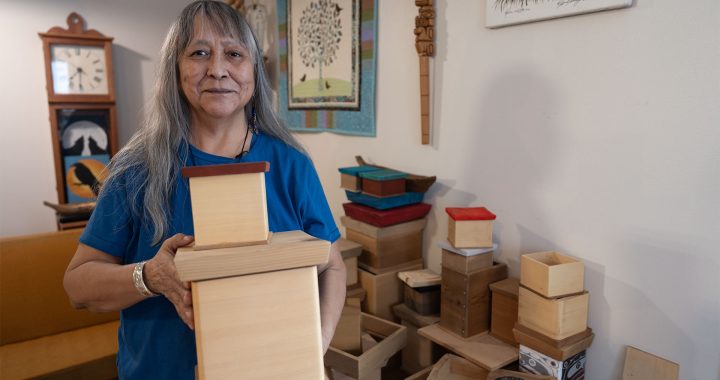One sentence, 10 powerful words deep inside a three and a half minute song called Orange Shirt Day.
“For the children who were never allowed to come home.”
The song, was written and produced by Karmen Omeasoo, also known as Hellnback and Lisa Muswagon. The song is a collaboration with other Indigenous artists within the music industry including Sten Joddi, Mack Sickz and Boogey the Beat.
“The hook for it goes, my natives up, like every day is orange shirt day,” said Omeasoo, adding, “It’s basically just aimed to be positive, the world we see now, we flipping it.”
The husband and wife once had separate music careers, now they make up The Resilience.
Both are children of residential school survivors and both also attended day school.
“It’s a real dark history. We know that. But at the same time, as Hellnback says, ‘we want to flip that’ but also too explain the value of who we are as Indigenous people now,” said Muswagon.
“We know that it was our parents who went to the schools, even us too going to day school. Our daughters are in nursery, kindergarten and grade one and they’ve asked [us], well what was it like for you?”
Muswagon said that she and her husband do their best to speak the truth to their kids about the system that was designed to kill the Indian in the child.
They find balance between sharing both the bad with the good said Omeasoo, but always remembering to show them how to be proud of who they are.
“We are just keeping everything original, you know, just breathing Aboriginal. Everything that we do from the moment we wake up until we go to sleep is embodying Indigenous,” Omeasoo said.
Orange Shirt Day isn’t their first song they have written about residential schools.
Not long after the announcement of possible unmarked graves in Kamloops, British Columbia back in May 2021, the duo wrote and produced a music video called Journey.
Muswagon sings the chorus of that song that states, “215 is the number that started the revolution.”
They wanted to make their mark on the Hip-Hop scene with real-life issues impacting the Indigenous community.
Their latest song, they wanted to name after the original name of Sept. 30, which is now recognized as the National Day for Truth and Reconciliation.
“It already means a lot to Phyllis (Webstad), who wore the orange shirt to school and got bullied for it,” Muswagon said referring to the woman who Orange Shirt Day was created in honour of as part of the Truth and Reconciliation Calls to Action. “And thinking about that story,then every child matters (campaign) and now the recent announcements of anomalies.”
This past year, Muswagon also did some work for her community, the Pimicikamak Cree Nation and the Assembly of Manitoba Chiefs, to help with research and the searching of unmarked graves around former residential school sites in northern Manitoba.
Her husband, who was by her side every step of the way, said that while sharing Indigenous truths is at the forefront of the work they do, they also share some responsibility in breaking ground in other ways.
“There is a lot of kids out there that don’t listen to the law. They don’t listen to teachers. They don’t listen to authorities. They don’t even listen to elders, you know what I mean, but they listen to music,” Omeasoo said understanding the influence he can have on young folks.
And also on the older generations and how they view hip hop. Omeasoo, of Samson Cree Nation of the Maskwacis communities in Alberta, has been rapping for more than half his life.
“We had to really break that stigma of everybody thinking that what we were doing is gangster,” said Omeasoo who also shares he was often asked, “Why you trying to emulate black people? When we would go to the hip hop shows they would give it to us on that side too, like why you guys not doing pow wow music? So, we always had to work harder.”
Working hard is something, The Risilience, knows all too well. Parents to five kids, and on a kidney journey together, as Omeasoo battles stage four chronic kidney disease. But it’s something that’s brought them all closer.
“Family is everything,” said Muswagon, “They tried everything to assimilate us and we are still here fighting.”
Orange Shirt Day was made available on all platforms as of Sept. 19.
The Resilience is working on an album they hope to release in the new year with songs that tackle other heavy subjects such as Missing and Murdered Indigenous people, police brutality, and other current affairs.
“We wanted to make them impactful,’ said Muswagon, “We want to make the music vibe.”










